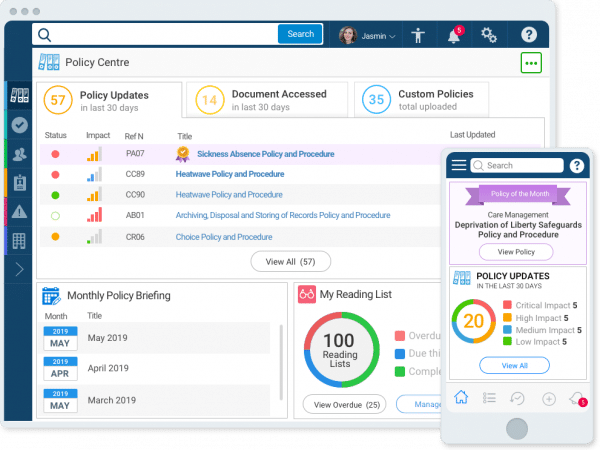Clinical Governance Made Simple
Today, within general practice, there is an emphasis on Clinical Governance. The QCS management system integrates Clinical Governance, ensuring that this important philosophy is not overlooked.
All policies, procedures and forms included within the Clinical Governance section are based upon the eight key ‘pillars’ which underpin it. They are:
1. Staff Management.
The appropriate recruitment and management of staff
a) Good relationships with staff;
b) The right staff in the right place at the right time;
c) Under-performance addressed;
d) Well motivated and ensured of continuing education;
e) Good working conditions.
2. Public and Patient Involvement.
Public and Patient feedback used to improve services.
a) Patient feedback;
b) Good complaints monitoring and recording system;
c) Patient forum.
3. Risk Management.
Systems to understand, monitor and minimise risk to staff and patients.
a) Compliant with local protocols and rules;
b) Learning from mistakes and incidents;
c) Reporting systems for critical incidents and identifying risk;
d) Promoting responsible learning culture.
Sign Up For Our No Obligation Free Trial
4. Clinical Effectiveness.
“Performing the right treatment to the right person at the right time and in the right place”.
a) Evidence-based approach;
b) Ability to change procedures according to new evidence;
c) Compliant with outside guidelines (NICE);
d) Continuous learning culture.
5. Education and Training.
Appropriate support for staff to be competent.
a) Continued Professional Development for individuals;
b) Facilitating further education and professional exams;
c) Assessment to make sure further education is appropriate;
d) Regular Appraisals.
6. Information Management (and IT).
Make sure patient data is accurate, safe and up to date.
a) Good data collecting systems;
b) Confidentiality assured;
c) Feed into Audits.
7. Audit.
To monitor Clinical Practice.
a) To remedy deficiencies;
b) Reflective, personal learning;
c) Evidence of compliance;
d) Not “one off”, but audit loops.
The CQC have spread their idea of Clinical Governance across the Essential Standards, to develop an approach which marries together the CQC philosophy on providing excellent, safe healthcare with the general principles of Clinical Governance. Our General Practitioner Management System contains a whole range of policies and procedures within the clinical governance section which meet the necessary CQC criteria.
8. Clinical Governance Policies.
Examples of the types of policies you can expect to find within the Clinical Governance section of the QCS General Practitioner Management System, include: Risk Policies; Equipment Safety Policy; Premises Safety Policy; Infection Control and Decontamination Policy; PPE Policy; Practice Legionella Policy; General Health and Safety Policy; Radiography Policy; Confidentiality Policy; Prevention and Public Health; Diversity and Respect Policy; Patient Involvement Policy; Child Protection; Audit Policy; Evidence Based Treatment and Clinical Effectiveness Policy and many, many more.
The Clinical Governance section has been designed with the busy General Practitioner and Practice Manager in mind, so it is clear, concise and includes useful forms which can be utilised to judge compliance levels.


